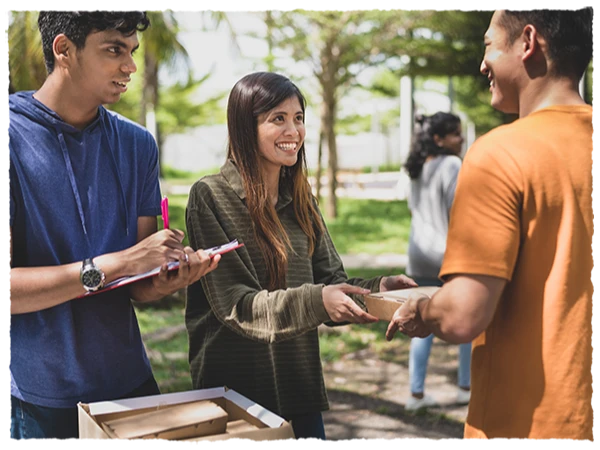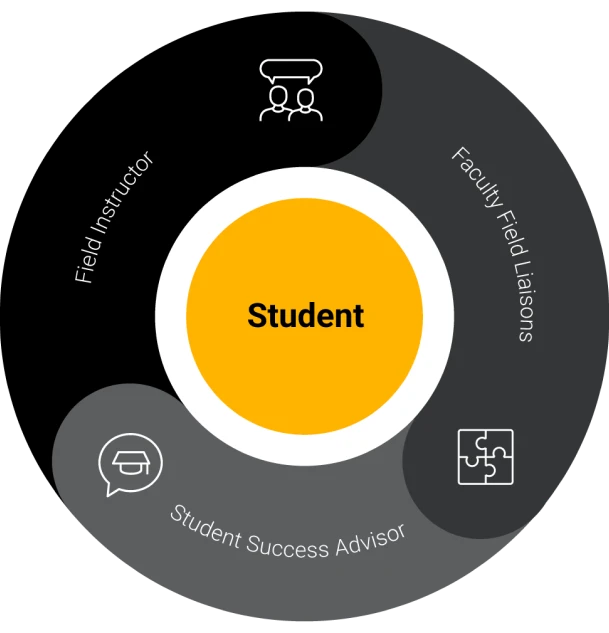Unleashing Real-World Impact Through Field Education
Request Information
Field education is a crucial component of your education, allowing you to apply the theoretical knowledge you’ve gained in your coursework in real-world settings. By observing and learning from experienced practitioners, you’ll also have the opportunity to model professional behavior and best practices, gaining insights and skills from those leading the field. These hands-on experiences are essential for developing the skills and confidence needed to make a meaningful and lasting impact in your community.
Comprehensive, Hands-on Learning
The VCU School of Social Work’s Office of Field Education ensures all students, regardless of location, receive the same rigorous, experiential education. We integrate evidence-based practices throughout your training, helping you gain experience while applying the latest research-supported methods. As an online student, you’ll complete field placements at local agencies. We have connections with a range of social work settings, including schools, hospitals, community centers, shelters, nursing homes, detention centers and mental health clinics.
Experience Overview
Before the semester starts, you’ll complete a field application, indicating your interests and planned direction within the field. Your placement will be based on the best match between you, your community’s needs and the opportunities available at local agencies.
Students in the 42-hour advanced standing track have one placement totaling 750 hours (600 concentration and 150 generalist), which lasts through all three semesters. Students in the 60-hour regular standing tracks have two field placements at separate agencies; the 900 cumulative hours — 600 at the concentration placement and 300 at the generalist placement — exceed the requirements of our national accrediting organization, the Council on Social Work Education.
Field Placement Process
Prior to your first semester of field study, you’ll receive the field placement application, along with instructions on how to submit it.
You will list your top five areas of practice interest and will be matched to an agency for an interview based on those preferences. You’ll have two interview opportunities for successful field placement.
Matches are based on a number of factors, including:
- Your practice interests
- Your answers to essay questions
- Agency opportunities
- Your eligibility
If you need accommodations, you must connect with connect with Student Accessibility and Educational Opportunity (SAEO) before applying for field placement to ensure you have field placement-specific accommodations (not only classroom accommodations).
What are the required hours for field placements?
| Pathway | Number of Field Placements | Total Field Hours Required |
|---|---|---|
| Part-Time (four years) | Two | 900 (300 generalist, 600 concentration) |
| Accelerated Part-Time (three years) | Two | 900 (300 generalist, 600 concentration) |
| Full-Time (two years) | Two | 900 (300 generalist, 600 concentration) |
| Accelerated Full-Time (16 months) | Two | 900 (300 generalist, 600 concentration) |
| Advanced Standing (12 months) | One | 750 (150 generalist, 600 concentration) |
Number of Field Placements
Two
Total Field Hours Required
900 (300 generalist, 600 concentration)
Number of Field Placements
Two
Total Field Hours Required
900 (300 generalist, 600 concentration)
Number of Field Placements
Two
Total Field Hours Required
900 (300 generalist, 600 concentration)
Number of Field Placements
Two
Total Field Hours Required
900 (300 generalist, 600 concentration)
Number of Field Placements
One
Total Field Hours Required
750 (150 generalist, 600 concentration)
Field Education Supports
Field Instructor
Field instructors supervise students in their agencies once a week for at least one hour. They are appointed by the School of Social Work after a thorough evaluation and are considered extensions of the school’s faculty, with the same fierce commitment to social work education.
Faculty Field Liaisons
Field liaisons are full-time or adjunct faculty members in the School of Social Work who connect the school to the student placement agencies. They facilitate learning in the field, monitor student progress, foster teaching opportunities in the practice community and evaluate the field placement from the perspective of student achievement and placement quality.
Student Success Advisor
Student success advisors assist students in navigating the field education process, from helping them develop their course curricula and registering for courses to understanding the field education manual, applying for placements and tracking their progress. They serve as a valuable sounding board and referral source, offering personalized guidance and support throughout the field experience.


“A quote from a student about the online learning experience.”
– Name, Information
Where might you complete your field assignment?
- Field assignment spotlight #1

What will you do in a generalist placement?
Generalist practitioners use a range of prevention and intervention methods in their practice to promote mental and social well-being in individuals, families, groups, organizations and communities. Here are a few examples of work you might encounter during a field placement.
Work With Individuals
- Observe a client intake, interview or assessment and take notes to discuss with your supervisor
- Attend interdisciplinary conferences and case presentations on clients
- Assess program services by interviewing former clients
Work With Families
- Observe an intake, interview or assessment of a family you are working with and take notes for discussion with your field instructor
- Attend a court hearing with a family, review a court hearing and/or prepare a court report
Work With Groups
- Visit agencies that specifically serve members of minority groups to learn how their services differ from those offered by the field placement agency; examples include refugee programs, women’s centers, LGBTQ+ community centers and advocacy groups
- Simulate and record a group session to further reflect on group facilitation/management skills
Work With Organizations
- Locate and study news articles, community resource directories, census data and historical materials to deepen your understanding of a particular social problem addressed by your agency
- Attend board of directors or advisory board meetings and consider how the topics relate to the agency’s mission, goals, programs and funding
Work With Communities
- Attend community public meetings and consider how the topics relate to the agency’s mission, goals, programs and funding
- Read grant proposals and reports written by the agency to understand how it secures the appropriate funding to meet community needs